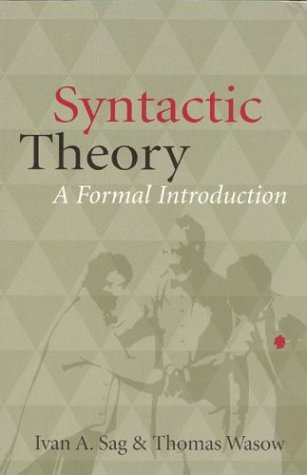
Syntactic Theory: A Formal Introduction
by Ivan A. Sag, Thomas Wasow
Publisher: Center for the Study of Language 1999
ISBN/ASIN: 1575861607
ISBN-13: 9781575861609
Number of pages: 483
Description:
This textbook grew out of our efforts to develop teaching material for the undergraduate-level Introduction to Syntax course that has been taught at Stanford University for over twenty years. It is particularly well suited to general readers or those who work in disciplines related to linguistics, such as psychology, philosophy, mathematics, or computer science.
Download or read it online for free here:
Download link
(2.3MB, PDF)
Similar books
 Compositional Semantics
Compositional Semanticsby Gary Hardegree - UMass Amherst
Contents: Basic Categorial Syntax; Shortcomings of Standard Categorial Syntax; Expanded Categorial Syntax; Examples of Expanded Categorial Syntax; Categorial Logic; Basic Categorial Semantics; Lambda-Abstraction; Expanded Categorial Semantics; etc.
(16299 views)
 Introduction to Phonetics for Students of English, French, German and Spanish
Introduction to Phonetics for Students of English, French, German and Spanishby Rodney Ball - HumBox Project
A course in phonetics for students of French, German and Spanish. It focuses on the structure and function of the vocal tract, the classification of vowels and consonants, the International Phonetic Alphabet and its use in phonetic transcription.
(11566 views)
 Analyzing Linguistic Data: A Practical Introduction to Statistics
Analyzing Linguistic Data: A Practical Introduction to Statisticsby R. H. Baayen - Cambridge University Press
This book provides an introduction to the statistical analysis of quantitative data for researchers studying language and language processing. Designed for linguists with a non-mathematical background, it clearly introduces the basic principles ...
(9324 views)
 Semantics: Theory and Application
Semantics: Theory and Applicationby Clea Rameh (ed.) - Georgetown University Library
This book discusses current developments in semantics and its relationships to theoretical linguistics, to applied linguistics, and to other related disciplines. It includes the fields of anthropology, computer science, philosophy, and psychology.
(11804 views)